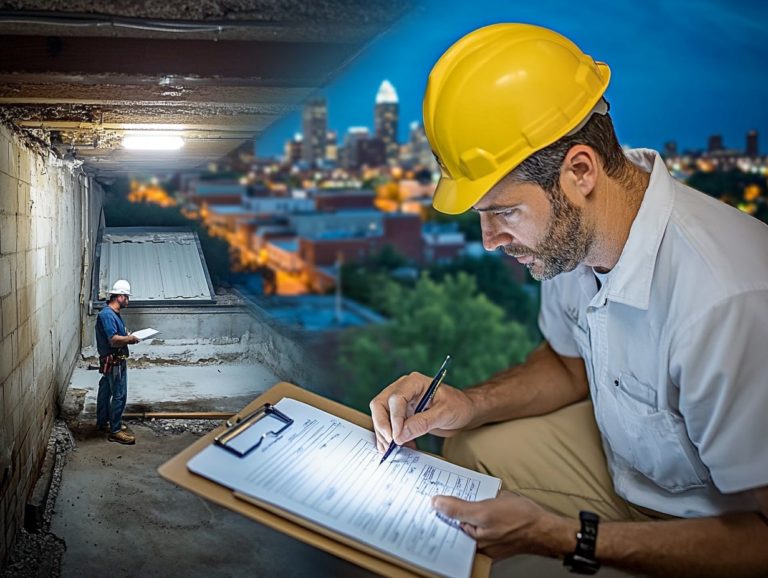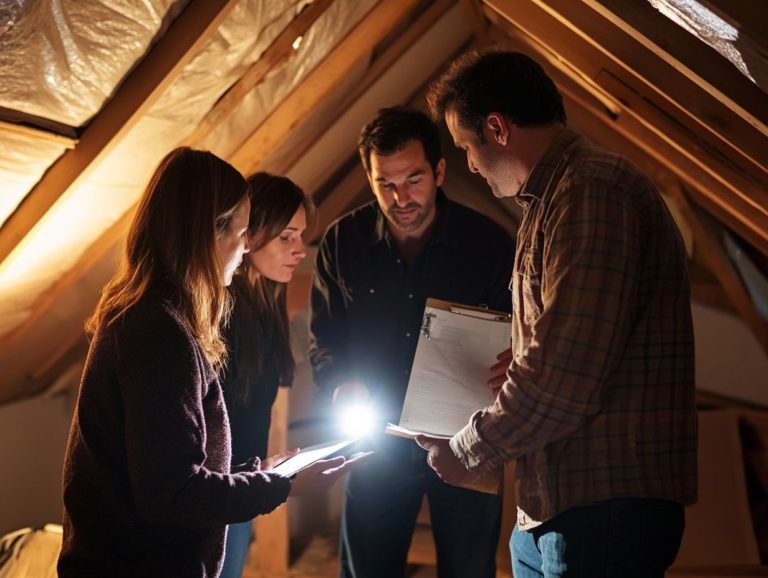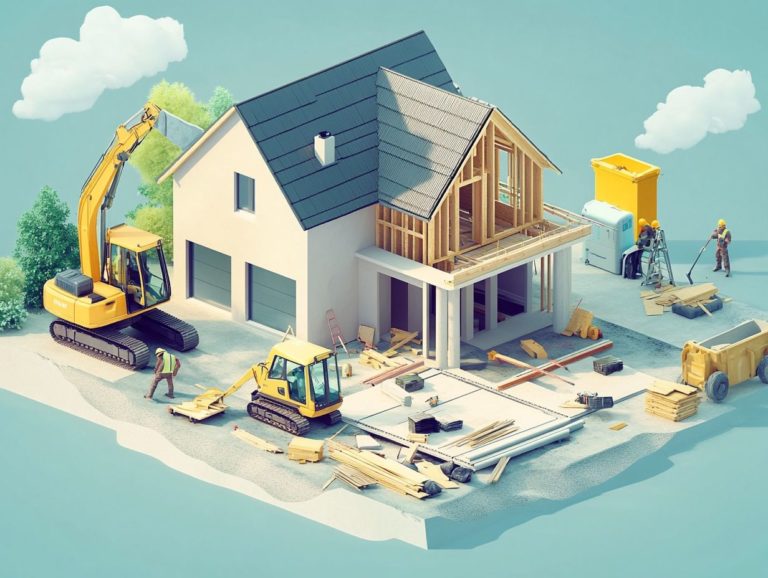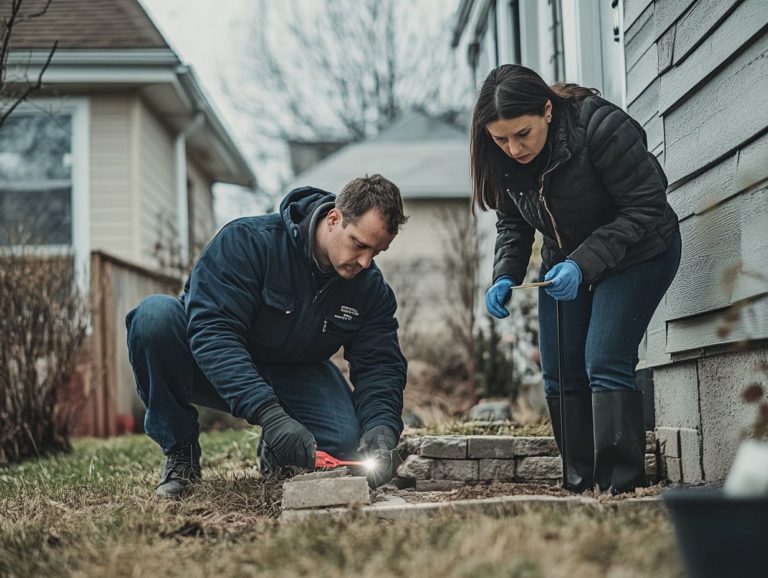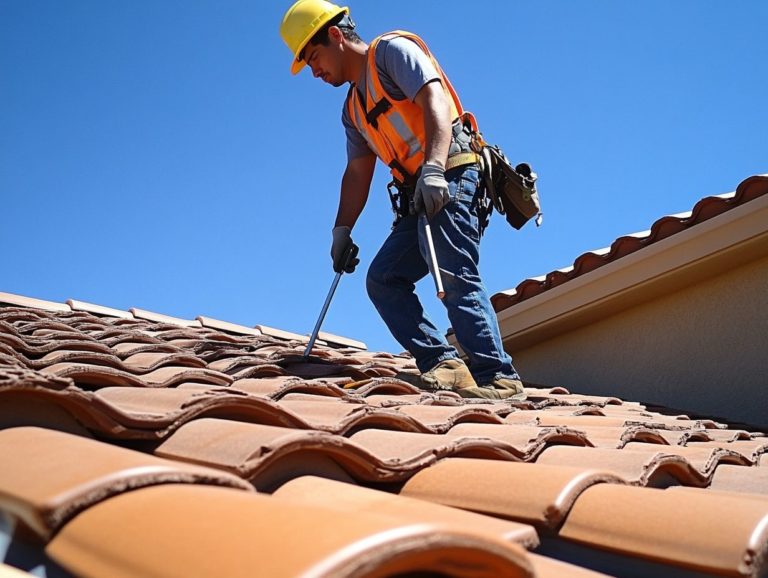The Essential Home Inspection Toolkit
When it comes to home inspections, possessing the right tools can significantly impact your results. Equip yourself with the right tools today. Identifying potential issues early can save you thousands down the line!
Whether you re a seasoned professional or a dedicated DIY enthusiast, understanding which instruments to utilize is essential for accurately assessing a property’s condition. This guide delves into the indispensable tools every inspector should have, ranging from measuring devices and plumbing equipment to safety gear and specialized tools.
Equip yourself for thorough and effective home inspections, ensuring you identify potential issues before they escalate into costly problems.
Contents
- Key Takeaways:
- 1. Basic Tools Needed for a Home Inspection
- 2. Measuring and Leveling Tools
- 3. Electrical Tools
- 4. Plumbing Tools
- 5. HVAC Tools
- 6. Roofing Tools
- 7. Exterior Inspection Tools
- 8. Interior Inspection Tools
- 9. Safety Gear
- 10. Additional Tools for Specialized Inspections
- How to Use Each Tool Effectively
- Frequently Asked Questions
- What is The Essential Home Inspection Toolkit?
- What tools are included in The Essential Home Inspection Toolkit?
- Why is The Essential Home Inspection Toolkit important for home inspectors?
- Can The Essential Home Inspection Toolkit be used by non-professionals?
- Is The Essential Home Inspection Toolkit suitable for all types of homes?
- Can The Essential Home Inspection Toolkit be customized?
Key Takeaways:
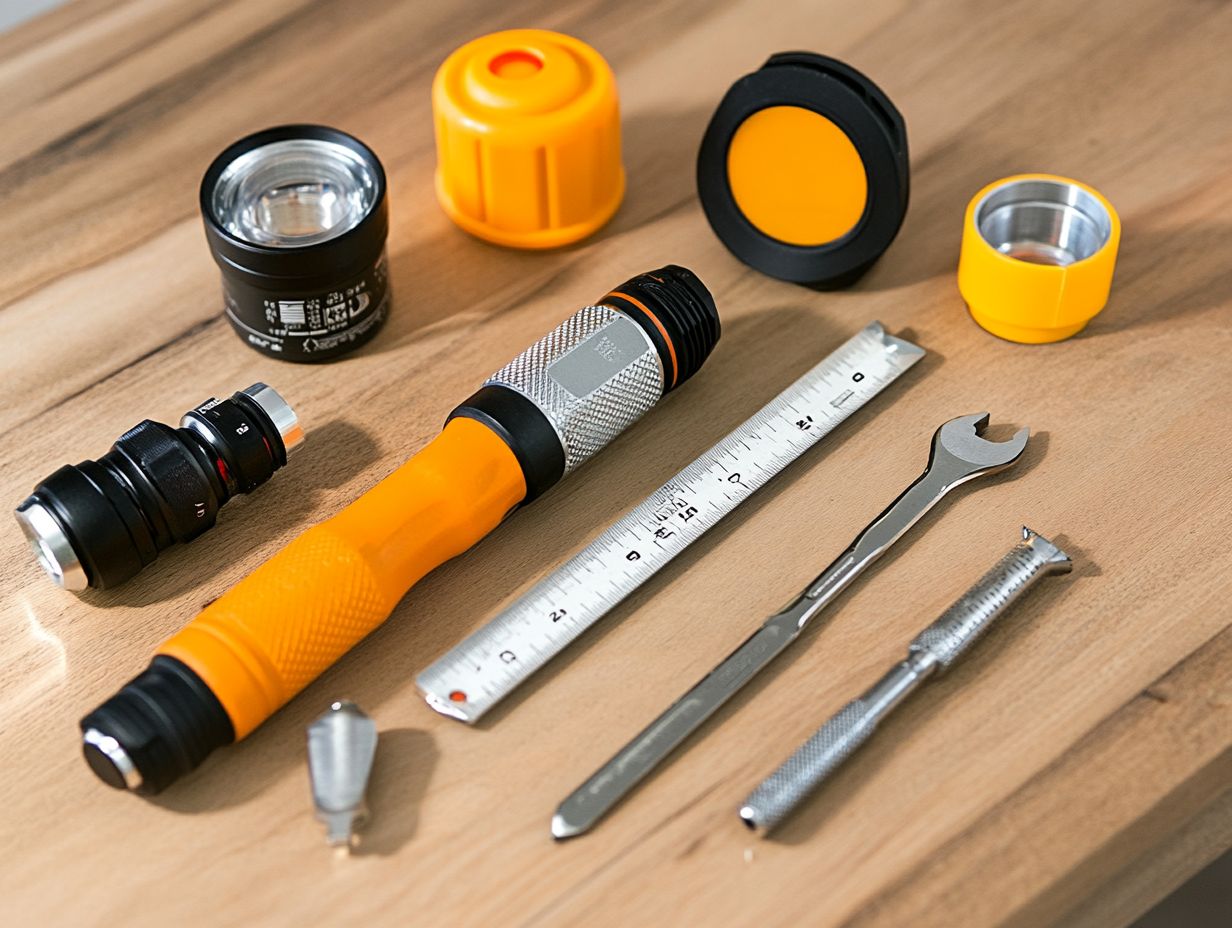
- A basic home inspection toolkit should include tools for measuring, leveling, electrical, plumbing, HVAC, roofing, exterior, and interior inspections.
- Safety gear is essential for protecting against potential hazards during any home inspection.
- Specialized inspections may require additional tools. Know how to use each tool effectively for a thorough and accurate assessment.
1. Basic Tools Needed for a Home Inspection
Home inspectors depend on a well-curated collection of essential tools to carry out comprehensive and effective inspections. This ensures properties meet high standards set by the International Association of Certified Home Inspectors and protects everyone involved.
By employing these tools, you can uncover issues that might otherwise slip through the cracks, such as hidden leaks or faulty wiring. A flashlight becomes your trusted companion for illuminating shadowy corners and attics, while the electrical tester confirms that outlets and circuits are safe and functional.
A moisture meter alerts you to excessive moisture levels in walls, signaling potential mold growth. The infrared camera uncovers temperature variations that indicate insulation gaps or energy loss. Each of these instruments is crucial for delivering accurate assessments, underscoring the necessity of having the right equipment at your fingertips.
Safety protocols, including personal protective gear like gloves and hard hats, further elevate the inspection process, ensuring that while you address issues, you remain shielded from hazards.
2. Measuring and Leveling Tools
Measuring and leveling tools are essential elements in your home inspection toolkit, enabling you to assess structural integrity and ensure adherence to safety standards. These instruments ranging from tape measures to laser levels and plumb bobs perform a variety of critical functions during the inspection process.
- Tape measures offer quick and precise distance measurements, enabling you to evaluate room dimensions and spot any irregularities.
- Laser levels project a visible line that helps determine horizontal and vertical alignments, which is vital for checking a home’s foundations and confirming the proper installation of fixtures.
- Specialized tools like the digital level take precision up a notch with advanced technology, allowing you to capture subtle variations that may indicate deeper issues.
This capability ultimately contributes to a more thorough and dependable inspection, enhancing the overall quality of your work.
3. Electrical Tools
Electrical tools are absolutely critical for home inspectors like yourself, enabling you to assess the safety and functionality of electrical systems in residential properties. Among these essential instruments are voltage testers and outlet testers, which play a crucial role in identifying potential hazards.
Voltage testers allow you to detect live wires, ensuring you can determine whether an electrical circuit is operational or poses a danger. Similarly, outlet testers evaluate power outlets for correct wiring and grounding, offering vital insights into compliance with safety standards.
It’s crucial to understand these test results; any reading outside the normal range could signal issues needing immediate attention. Proper interpretation of these findings not only upholds safety but also reinforces best practices in electrical maintenance.
4. Plumbing Tools
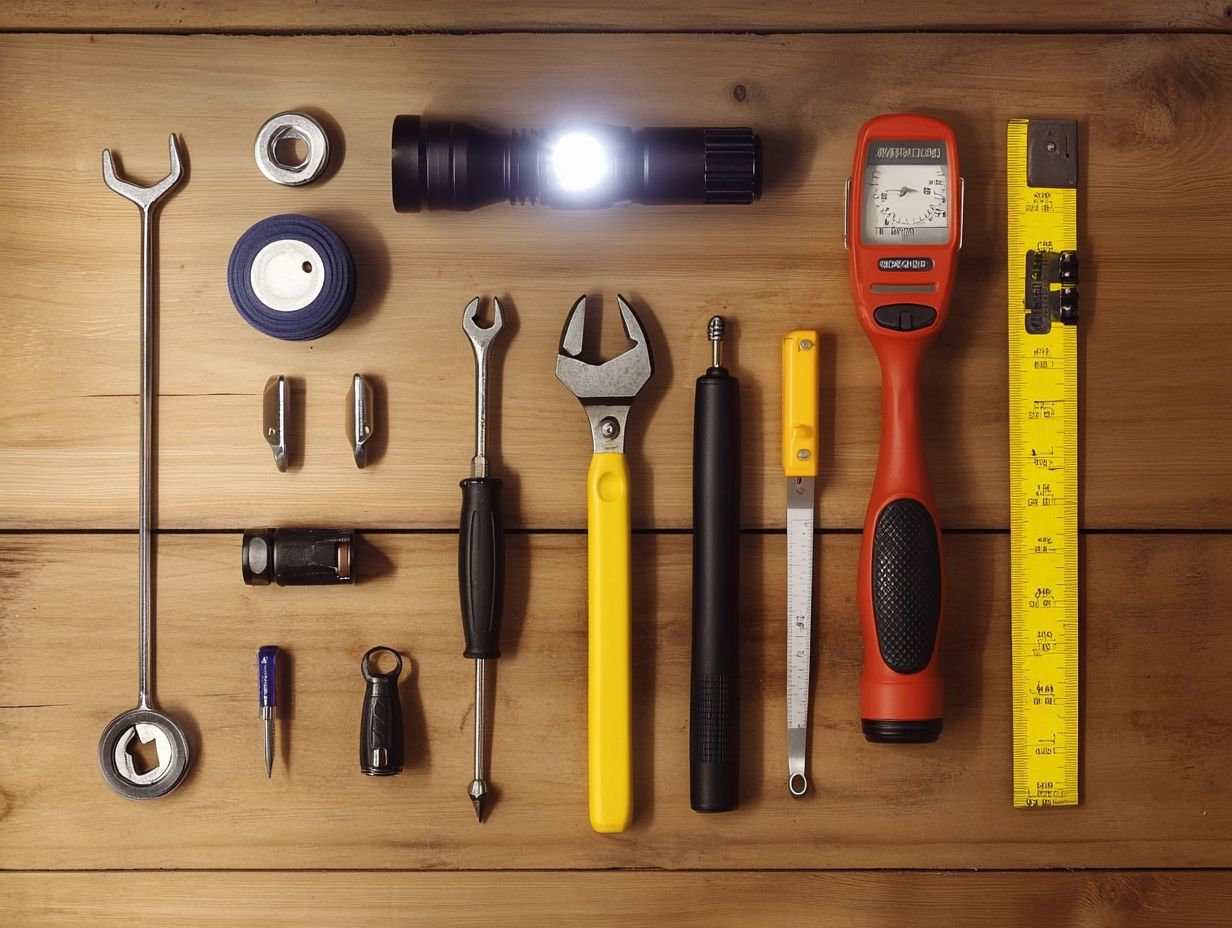
Plumbing tools are critical for home inspectors. They equip you to assess plumbing systems and identify potential issues that could compromise property safety.
You ll rely on various diagnostic tools, such as moisture meters, to uncover hidden leaks that might not be immediately apparent. By measuring moisture levels within walls and ceilings, you can detect water damage before it becomes a larger problem.
Pressure gauges are also used to evaluate water pressure throughout the system, ensuring compliance with local codes and standards. Collectively, these specialized tools enable thorough assessments, ensuring plumbing systems function efficiently and protect the health and safety of occupants.
5. HVAC Tools
HVAC tools are essential for home inspectors. They enable thorough evaluation of heating, ventilation, and air conditioning systems to ensure they operate efficiently and safely.
These specialized instruments are your best allies in spotting potential issues that could present hazards or lead to increased energy costs. For example, a carbon monoxide analyzer is critical for detecting dangerous levels of this odorless gas, signaling significant safety risks within the system.
Infrared cameras can identify temperature differences, highlighting areas where heat loss may be occurring. Using these tools offers valuable insights into HVAC systems, helping homeowners make informed decisions about repairs or upgrades.
6. Roofing Tools
Roofing tools are vital in home inspections. They enable you to assess and evaluate roof conditions while prioritizing your safety.
High-traction roof boots provide the grip necessary to navigate steep or slippery surfaces, significantly reducing the risk of falls. Telescoping ladders offer flexibility and stability, allowing you to reach various heights safely.
Keep yourself safe with these essential safety tips:
- Don protective gear
- Use harnesses when needed
- Implement a buddy system
This enhances safety and boosts the overall efficiency of your inspection efforts.
7. Exterior Inspection Tools
Exterior inspection tools are crucial for home inspectors. They allow you to evaluate the external condition of properties and ensure any potential issues are promptly identified and addressed.
These tools are pivotal in assessing vital components such as the foundation, siding, and overall structural integrity of a home. Moisture meters are essential for detecting hidden moisture levels within materials, signaling potential problems like water damage or mold growth that could jeopardize safety.
Gas detectors are equally important for identifying leaks that may pose significant health risks. Utilizing these instruments gives homeowners a comprehensive understanding of their property’s condition, enabling them to make well-informed decisions regarding necessary repairs and maintenance.
8. Interior Inspection Tools
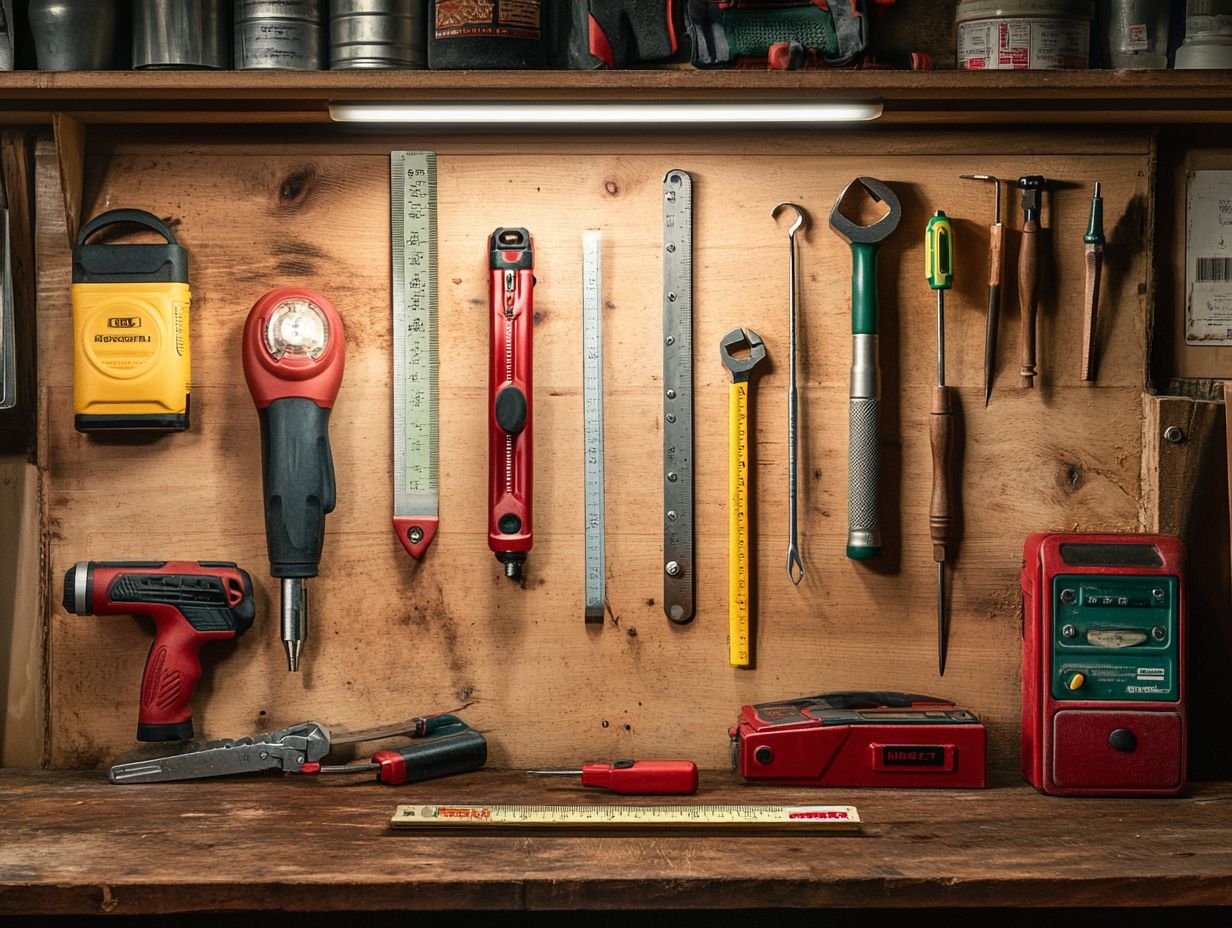
Interior inspection tools are essential for home inspectors. They allow you to evaluate the condition of various rooms, systems, and structures within a home.
Key instruments include moisture meters and various diagnostic tools. Moisture meters pinpoint hidden leaks or moisture intrusion that can lead to mold growth, wood deterioration, or other safety hazards.
You ll also use tools like thermal imaging cameras and electrical testers to uncover temperature differences and assess the integrity of electrical systems. Using these tools helps ensure homes meet safety standards and foster a healthy living environment.
Make sure you have these tools ready for your next home inspection!
9. Safety Gear
Safety gear is absolutely essential for home inspectors, ensuring protection from potential hazards while navigating various environments.
Considering the diverse conditions you ll encounter, it s vital to equip yourself with key items like:
- Respirators to defend against harmful airborne particles
- Safety goggles to shield your eyes from debris and chemicals
- High-traction roof boots for stability on sloped surfaces
By prioritizing this protective gear, you not only reduce the risk of physical injuries but also enhance your overall work efficiency.
Each piece of equipment helps you conduct better assessments, making safety a critical part of your professional toolkit.
10. Additional Tools for Specialized Inspections
Additional tools for specialized inspections enable you, as a home inspector, to address unique challenges. This ensures that your property evaluations go well beyond standard assessments.
Discover advanced instruments, like continuous radon monitors, that help you spot hidden health risks quickly!
Gas leak detectors are crucial for identifying dangerous leaks before they pose serious risks to occupants.
Utilizing drones gives you an aerial perspective, enabling you to scrutinize hard-to-reach areas, such as rooftops or solar panels, with remarkable precision.
By integrating these innovative technologies into your toolkit, you can uncover invaluable insights into a property’s distinctive conditions. This ultimately guides both buyers and sellers toward more informed decisions.
How to Use Each Tool Effectively
Understanding how to use each tool effectively is essential for conducting thorough safety inspections and ensuring accurate evaluations throughout the inspection process.
With a variety of specialized instruments at your disposal, it s crucial to familiarize yourself with the proper handling and application of each one. This not only enhances the reliability of your findings but also promotes safety during your inspections.
For example, a moisture meter can pinpoint areas of water intrusion, enabling you to assess potential mold risks.
Thermal imaging cameras help detect heat loss in insulation, providing valuable insights into energy efficiency.
By adopting a systematic approach to using these tools and adhering to best practices, you can deliver a comprehensive assessment that homeowners can genuinely trust.
Frequently Asked Questions
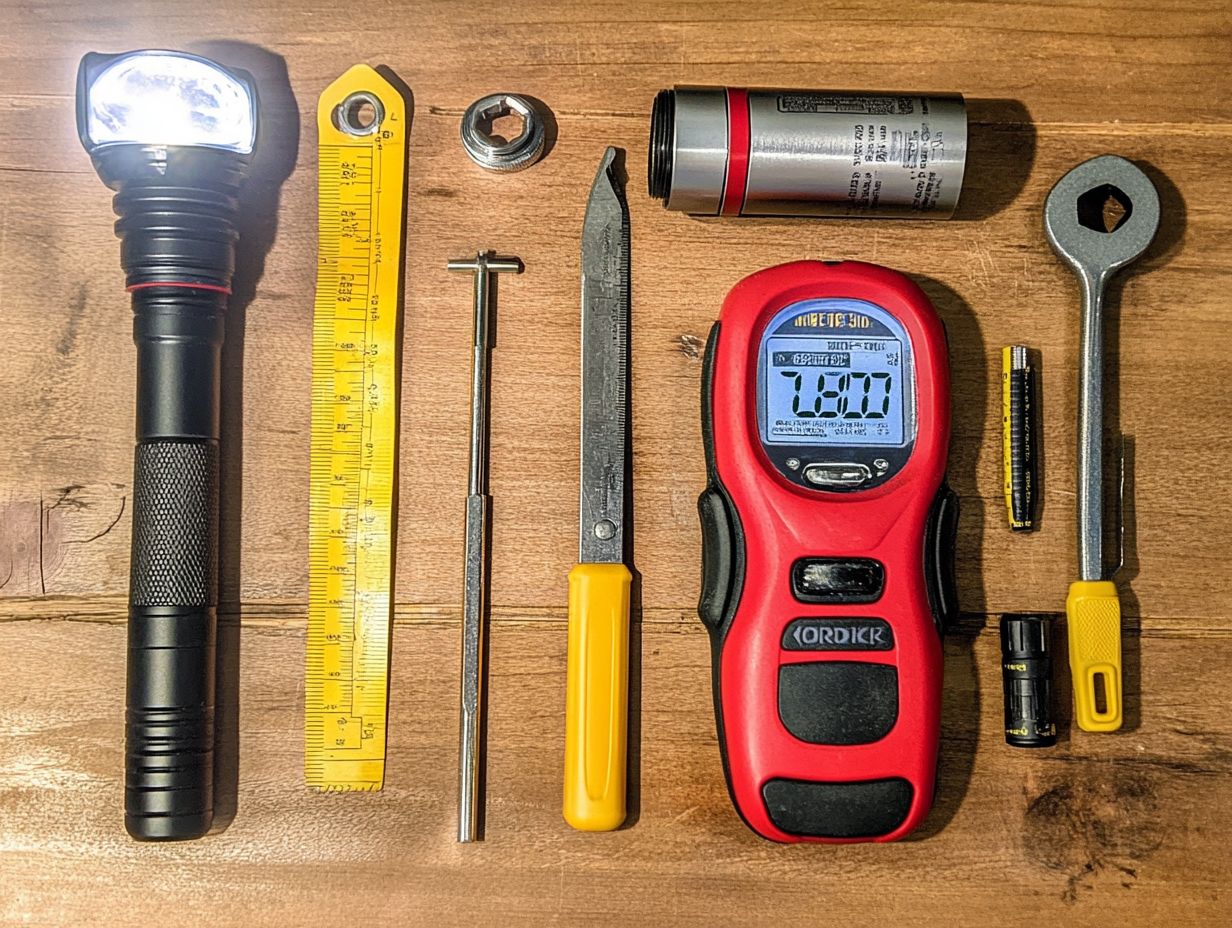
What is The Essential Home Inspection Toolkit?
The Essential Home Inspection Toolkit is a comprehensive set of tools specifically designed for conducting home inspections. These tools are essential for any home inspector to accurately assess the condition of a property.
What tools are included in The Essential Home Inspection Toolkit?
The Essential Home Inspection Toolkit includes a variety of tools such as a flashlight, moisture meter, electrical tester, infrared thermometer, and more. It also includes a carrying case for easy transportation.
Why is The Essential Home Inspection Toolkit important for home inspectors?
The Essential Home Inspection Toolkit is important for home inspectors because it provides all the necessary tools in one convenient set. This ensures that home inspectors can accurately and efficiently perform inspections, saving time and improving the quality of their work.
Can The Essential Home Inspection Toolkit be used by non-professionals?
Yes, The Essential Home Inspection Toolkit can be used by non-professionals who are interested in conducting their own home inspections. However, it is recommended to have some knowledge and experience in home inspections for proper use of the tools.
Is The Essential Home Inspection Toolkit suitable for all types of homes?
Yes, The Essential Home Inspection Toolkit is suitable for all types of homes, including single-family homes, condos, townhouses, and more. It is a versatile set of tools that can be used in various types of properties.
Can The Essential Home Inspection Toolkit be customized?
The Essential Home Inspection Toolkit cannot be customized as it is a pre-packaged set of tools. However, individual tools can be replaced or added to the set as needed.
Start using these tools today to elevate your inspection game!

